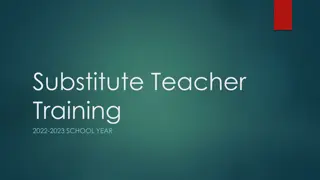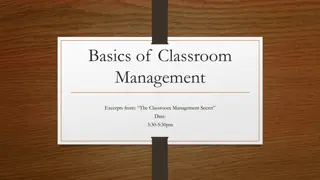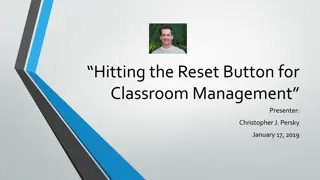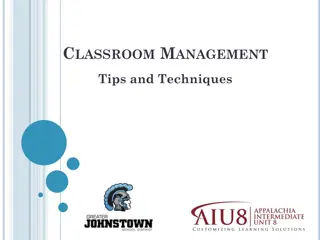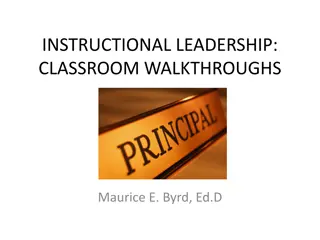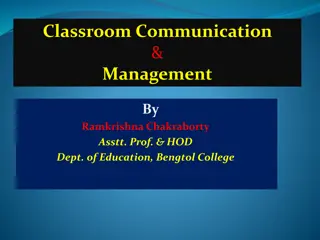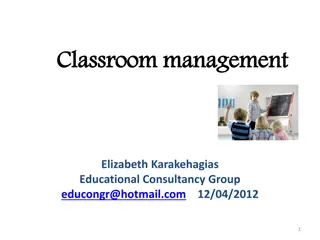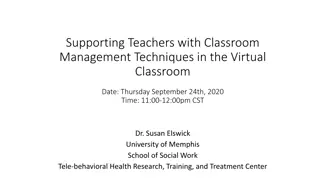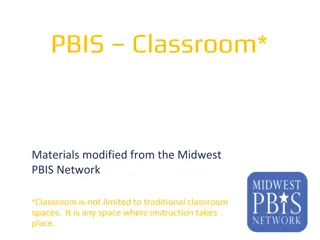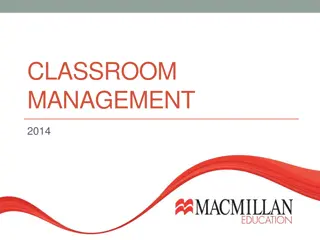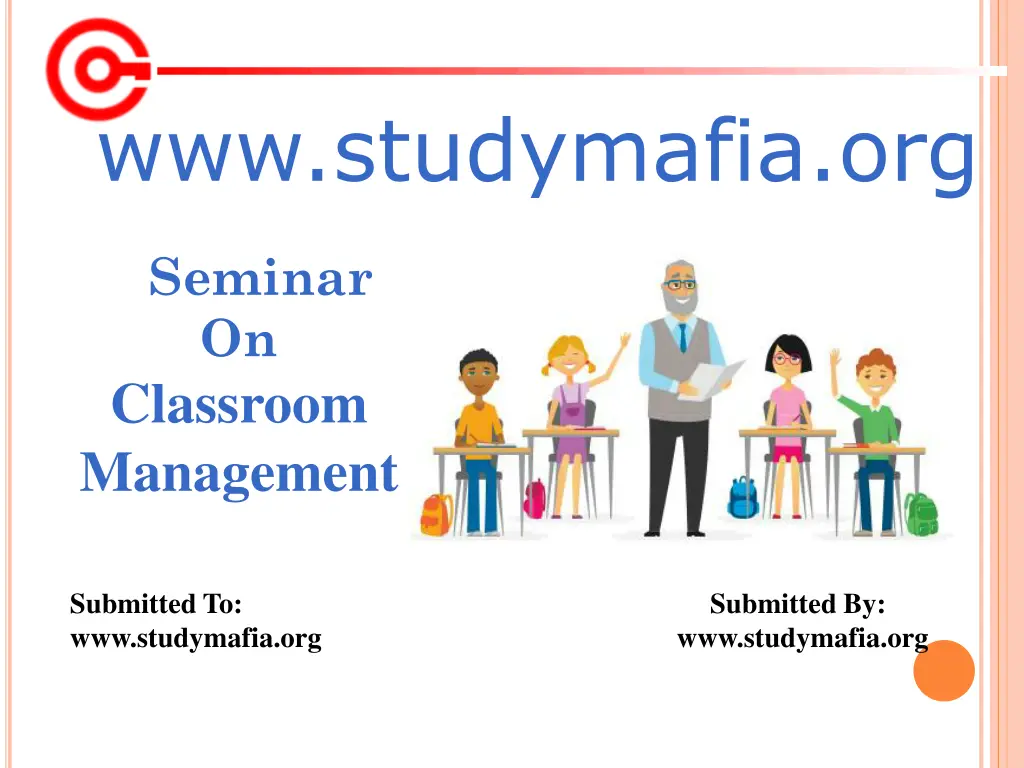
Effective Classroom Management Strategies for Teachers
Discover proven research-based strategies for effective classroom management, including understanding the importance of classroom rules, addressing common issues, and creating a positive learning environment. Explore the four key components of classroom management and learn practical tips to minimize disruptions and maximize student success.
Download Presentation

Please find below an Image/Link to download the presentation.
The content on the website is provided AS IS for your information and personal use only. It may not be sold, licensed, or shared on other websites without obtaining consent from the author. If you encounter any issues during the download, it is possible that the publisher has removed the file from their server.
You are allowed to download the files provided on this website for personal or commercial use, subject to the condition that they are used lawfully. All files are the property of their respective owners.
The content on the website is provided AS IS for your information and personal use only. It may not be sold, licensed, or shared on other websites without obtaining consent from the author.
E N D
Presentation Transcript
www.studymafia.org Seminar On Classroom Management Submitted To: www.studymafia.org www.studymafia.org Submitted By:
CONTENT Introduction What is Classroom Management? Objectives Why is it Important? Strategies Classroom Rules Classroom Management Issues Tips for Minimizing Problems References
Introduction Effective classroom management requires awareness, patience, good timing, boundaries, and instinct. There s nothing easy about shepherding a large group of easily distractible young people with different skills and temperaments along a meaningful learning journey.
WHATIS CLASSROOM MANAGEMENT? It s effective discipline It s being prepared for class It s motivating your students It s providing a safe, comfortable learning environment It s building your students self esteem It s being creative and imaginative in daily lessons
OBJECTIVES Understand proven research and sound theories that provide a foundation for quality classroom management Share effective classroom management strategies Implement classroom management strategies
WHYIS CLASSROOM MANAGEMENT IMPORTANT? Satisfaction and enjoyment in teaching are dependent upon leading students to cooperate Classroom management issues are of highest concern for beginning teachers Classroom management and effective instruction are key in ensuring student success and learning
WHAT ARETHE FOUR COMPONENTSOF CLASSROOM MANAGEMENT? 1. Classroom Design Arrange your classroom furniture, accessories, and learning aids thoughtfully. Think students' desks, learning stations, and device placement. 2. Instructional Technique Switch between learning styles with different classes. For example, you can engage your 3rd graders with digital gamification elements. Pique the curiosity of your 8th graders with small group discussions on their favorite topics.
WHAT ARETHE FOUR COMPONENTSOF CLASSROOM MANAGEMENT?...... 3. Classroom Rules Lead your class with a firm hand but make sure that students get the message. If you do well in the other departments, they ll understand the rules are in everyone s best interests. 4. Organization Keep your lessons organized and show up on time.
Meeting Mavlovs Hierarchy of Needs Growth Need Need for Self-Actualization Deficiency Esteem Needs Love and Belongingness Needs Safety Needs Physiological Needs Needs Discuss ways you meet Maslow s Hierarchy of Needs for your students with the people at your table Remember to focus on the needs you can meet, not the needs you can t meet
Establishing Classroom Routines and Procedures Knowledge of classroom procedures tells the students things like: What to do when the bell rings What to do when the pencil breaks What to do when you hear an emergency alert signal What to do when you finish your work early What to do when you have a question What to do when you need to go to the bathroom What to do when you want the my attention Where to turn in assignments What to do at dismissal of class
Establishing a Discipline Plan Investing time in teaching discipline and procedures will be repaid multifold in the effective use of class time. Here are a few things to keep in mind as you are establishing rules: Rules are expectations of appropriate behavior. You can state your expectations as rules Rules immediately create a work-oriented atmosphere Rules create a strong expectation about the things that are important to you. Include consequences What the student chooses to accept if a rule is broken. Include rewards What the student receives for appropriate behavior
Establishing Routines and Procedures for Parents Parents also need to follow procedures for the school and your class: You must be a model and follow the school s procedures How can you expect students and parents to follow procedures if you don t follow them? Allowing a parent to drop off a student tardy without a tardy pass because you don t want to ask them to walk to the office and back will hurt you in the long run. That parent will not understand when you call and explain that their child does not follow procedures because they saw that you didn t follow them either. Communicate classroom and school procedures to parents the first week of school and expect parents to follow them.
Establishing a Discipline Plan Investing time in teaching discipline and procedures will be repaid multifold in the effective use of class time. Here are a few things to keep in mind as you are establishing rules: Rules are expectations of appropriate behavior. You can state your expectations as rules Rules immediately create a work-oriented atmosphere Rules create a strong expectation about the things that are important to you. Include consequences What the student chooses to accept if a rule is broken. Include rewards What the student receives for appropriate behavior
Teamwork Implementing Classroom Management Take some time to discuss with your colleagues things that you have done that worked and things that didn t work. What are the areas are the strongest? Weakest? How can you help another colleague in the area where you are strongest? What do you need to improve the areas you thought were weak? What materials and/or resources are needed in order to improve your classroom management skills this year?
Classroom Rules Emmer (1994) suggested starting points a. Bring all needed materials to class b. Be in your seat ready to work when bell rings c. Respect and be polite to everyone d. Listen and stay seated when someone else is talking e. Respect other people s property f. Obey all school rules Student ownership of rules if they help establish them It will take a few weeks for students to adjust If a rule doesn t work, make it more realistic and enforceable May want to post rules or send a copy home with parents 1. 2. 3. 4. 5.
CLASSROOM MANAGEMENT ISSUES Academic Misconduct Aggressive Students Attendance Discussing Controversial Topics Disrespectful Instructors Dominant Students & Quiet Students Emotional & Psychological Problems Inattentive Students Unprepared Students
TIPSFOR MINIMIZING PROBLEMS Publish expectations in the syllabus and review in class. Address issues when they come up. Be consistent in application of University and course policies. 1. 2. 3.
TIPSFORBETTERCLASSROOM MANAGEMENT Always love the students The teacher should always love their students and stand against their behavior, which doesn t meet their expectations. The students can remind of their true worth if their teachers love them unconditionally. Praise their efforts The teacher should always praise the work of their students if they meet their expectations. It helps in creating positivity in the class.
TIPSFORBETTERCLASSROOM MANAGEMENT . Identify yourself The teachers should tell their students regarding who they are and why they are here. A class where all the students have a great confidence in their teacher often has the power to create a wonderful environment for learning. Having a plan The lesson plans of the teacher should be concise and clear and they required starting each day with a clear vision. In addition to that, the teacher should have a keen sense of the behavior they expect at every point in the class.
REFERENCES www.google.com www.wikipedia.com www.studymafia.org



